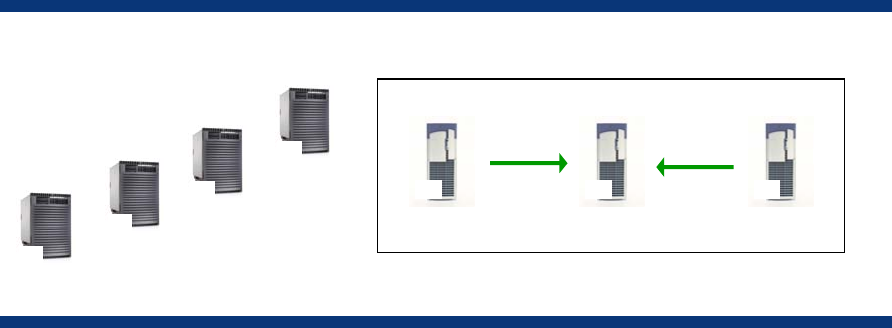Configuration Rules for a Mixed HP 9000 / Integrity Serviceguard Cluster, March 2007
Table Of Contents
- Executive summary
- Version history
- Introduction
- Architectural rules and typical configurations
- Specific ISV information
- HP Superdome Hybrid Servers
- Typical configuration examples
- Transition to Integrity with HP Superdome hybrid servers and mixed clusters
- Adding one Integrity server to a two-node HP 9000 cluster
- Adding two HP Integrity servers to a two-node HP 9000 cluster
- Adding one critical application and two new Integrity nodes to existing four-node HP 9000 cluster
- Mixed clusters as transition aid from HP 9000 to Integrity in a multi-tier SAP environment
- HP 9000 to Integrity transition service utilizing HP Serviceguard cluster technology
- How to implement a mixed HP 9000 / Integrity HP Serviceguard cluster
- For more information

The customer would also like to consolidate the database and the central instance for each of the
e a single
one package and placing it on the newly
)
ERP
Fi rity cluster
systems into a single package—one for the ERP system and one for the BW system—to simplify
operation and reduce the number of systems running mission-critical applications that pos
point of failure (SPOF) in the overall configuration.
The customer achieves this goal by:
• Consolidating the BW database and central instance in one package and placing it on node E
• Consolidating ERP database and central instance in
added HP Integrity server (node G
• Removing the old HP 9000 servers nodes B, C, and D from the cluster and redeploying them as
application servers of the ERP and BW system outside the cluster to add capacity on their
application layers
• Node F will host a non-critical application server of the ERP instance and function as a failover
node for the consolidated BW database and central instance from node E and the consolidated
database and central instance from node G
gure 13. Final three-node homogeneous Integ
This example shows how the support of mixed clusters enables the customer to transition from HP
9000 to Integrity systems over time at the pace fitting business needs.
ess would include the following steps:
e to the Integrity node.
he HP 9000 node.
Th ved back to the HP 9000 system
in
Old
Node A
HP 9000 to Integrity transition service utilizing HP Serviceguard cluster
technology
Another scenario exists in which a customer explicitly uses HP Serviceguard cluster technology for
transitioning an application from HP 9000 to Integrity servers.
A transition proc
• Create a one-node cluster with the existing HP 9000 server and package the application.
• Add a new HP Integrity server to the cluster.
• Move the application package from the HP 9000 nod
• Test the various failover scenarios and configurations.
– If the tests fail, move the package back to t
– Resolve the issue and start another iteration (move and test package).
• Remove the HP 9000 node from the cluster.
e benefit of this process is that the application can be quickly mo
case of issues showing up with the application on the Integrity server.
ERP App2
PA
Node B
Old
ERP App3
PA
Old
Node C
BW App
PA
ERP App
PA
Old
Node D
Node E
BW DB/CI
IPF
Node F
IPF
Node G
IPF
ERP App4 ERP DB/CI
26










